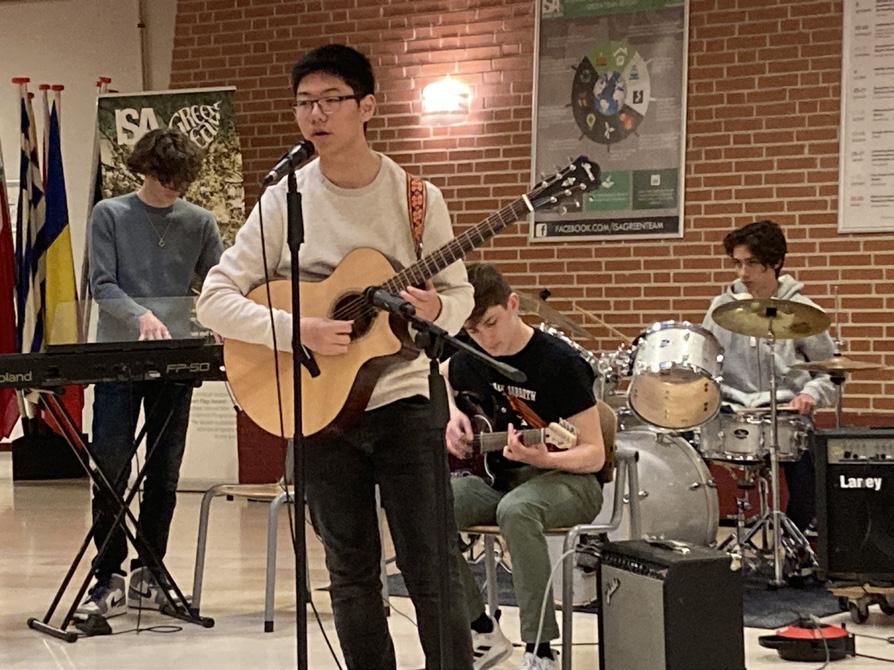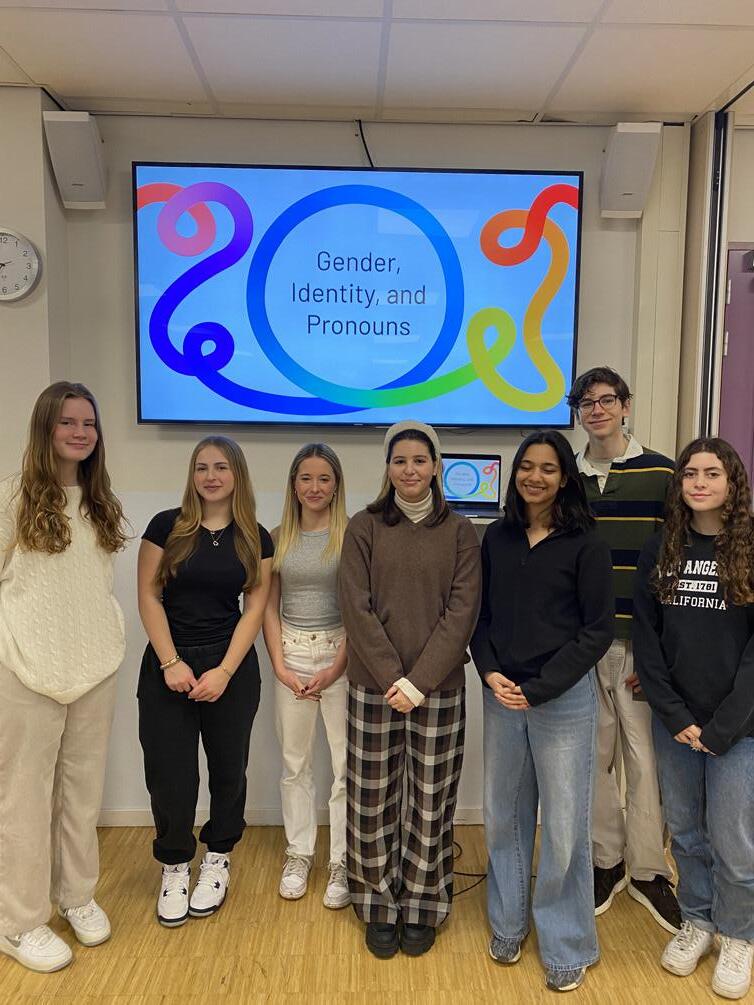Beliefs in Action



To Educate for International Understanding Developing Minds Developing Character Developing Community Issue 2 01: Inquiry and Reflection 02: Critical and Creative Thinking 03: Curiosity and Open-Mindedness 04: Professional Development
Highlights from our Community
Grade 4 Pioneers Their Own Business

Earlier this year, ISA saw the return of a beloved student-run event which has been a feature in the Main Foyer for several years: the Grade 4 Marketplace. The Marketplace is a culmination of several weeks of grade 4 students' hard work, research and planning, undertaken as part of their Marketplace unit of inquiry.

Step One: Interview Local Business Owners
As part of the unit, students had the opportunity to visit the local Amstelveen Marketplace to interview local business owners. They learned more about the costs involved in running a small business, how a business can market itself to potential customers and how pricing works.

Step Two: Engage with Parent Volunteers

Students also welcomed ten parent volunteers with business experience into their classrooms. The parents presented what it takes to run a successful business and discussed concepts such as supply and demand, market research and competition. Students had the opportunity to ask questions to deepen their understanding.
Step Three: Run a Business!
The unit culminated in the Grade 4 Marketplace, where students had the opportunity to put all of their learning into practice in a real-world setting by running a business of their own! Students selected, designed, crafted and cooked up a wide variety of goods to sell to the ISA community, including sweet treats, trinkets, toys, crafts and games. Their peers in other Lower School classes were able to shop at the Marketplace, and they enjoyed sampling the delicious treats and engaging with the crafts and games on offer.
Each stage of the unit allowed Grade 4 to experience for themselves what running a business, engaging with customers and selling products is like in various real-world settings and outside of a traditional classroom environment. The process was inquiry-driven, with students encouraged to make connections, reflect and ask “why” and not just “how”. Running their own business allowed students' curiosity and creativity to flourish and introduced them to the real-world concepts of professionalism and business acumen.
Professional Development in Action at ISA
Professional Development is a foundational belief of ISA. ISA provides staff with innovative, hands-on training opportunities and a forum to share ideas and network with leading experts and partners. From workshops in our professional development space, the Centre for Development, Learning and Technology (CDLT), to the Thought-full Schools Project, ISA staff are given the space to grow and develop. Here are highlights of just two the many professional development opportunities that took place this school year, with each one being run by an ISA staff member.
The workshop consisted of multiple strands and conceptual understandings, including a deep-dive into the concept of inquiry woven throughout the PYP. Adhering to the idea that ‘inquiry is purposeful and authentic’, participants were asked to consider the concept of inquiry in terms of supporting student agency and had the opportunity to analyse their own units and discuss whether, for example, an ‘overplanned’ unit of inquiry meant that students received too much guidance. Participants also discussed the differences between concepts and topics and analysed whether a specific unit of inquiry inspired students to take action to put their learning to use.
Teaching Students Through Neuroscience Programme

The Teaching Students Through Neuroscience Programme is a professional development opportunity for faculty members run at ISA for the past two years by MYP and DP Learning Support Teacher Todd Hanneman. Aiming to improve instructional practices with the learning brain in mind, Todd uses current brain research to discuss how best to engage with students in the classroom and support their academic and personal development.
Local and Global Inquirers PYP Workshop
In March, ISA hosted a professional development workshop for Lower School Faculty: the Local and Global Inquirers Workshop. Presented by Susan Loban, the Head of Lower School and herself a trained IB workshop leader, the workshop took place over two days and gave Lower School teachers the opportunity to come together to discuss their own teaching practices, share ideas and reflect on the ways in which they have been promoting student agency and inquiry in their classrooms.
The IB describes the workshop as ‘all members of a PYP learning community are supported in becoming inquirers. Investigate what it means to be an inquirer and develop your capability to design learning that draws on local and global contexts to challenge thinking, reflect and to act. Explore ways in which students can initiate and engage in their own inquiries connected to self and to others.’
Overall, the workshop invited participants to take the vision of inquiry, defined as the ‘leading pedagogical approach of the Primary Years Programme [...] recognizes students as being actively involved in their own learning and as taking responsibility for that learning’ and themselves in turn, to be a learner who nurtures their own agency, one who strives to make choices, have a voice and take ownership of their own professional learning.
Underscoring the importance of the workshop for Lower School educators, Susan said: “ISA is an experienced PYP school. These workshops are developed to be delivered at different levels of teaching experiences, offering a deep dive into concepts which are essential features of the PYP. Timed specifically to engage in in-depth discussion with other teachers, not only making connections but also hearing others points of view will hopefully challenge any assumptions we might be holding onto, helping us to stretch our practice as teachers. It allowed us to refresh our previous assumptions and question which practices and methods are worth holding onto and which are worth investigating again, ultimately asking the question: is this still the best way to teach this?”
This school year, the programme took the form of eight monthly sessions. The first session, covering the development of the brain throughout both the child and adolescent years, laid the foundation for the following sessions. Some of the following session themes included learning differences, the influence of technology, stress and anxiety, and resilience and grit. Each workshop consisted of a presentation by Todd, as well as plenty of opportunities for teachers to take a 'brain break' to reflect on their own teaching practices and discuss and share their experiences with each other.
Todd's goal was to help ISA teachers better understand neuroscience, using his professional background and personal interest in studying the brain in education to create an opportunity to share the latest neurological research with his colleagues. He believes that "each and every teacher can benefit from an understanding of how the brain works to support student development. In particular, understanding the adolescent brain and why feelings of anxiety happen allows teachers to approach the situation not only from a place of empathy but also with practical strategies to help the student manage their anxiety so they can accomplish tasks at every grade level with success."
Todd hopes the programme will allow teachers to continue developing themselves as educators through gaining a greater understanding of the learning process and brain development and was pleased with the enthusiasm and interest that took place during each session.
For ISA teachers, these opportunities to come together as educators are invaluable. The programme offered teachers an opportunity to reflect both on their own individual practices but also on the teaching practices in our organisation as a whole, questioning how we as a learning community can continue to improve. Overall, participants developed a better understanding of students of various ages and levels, and gained confidence in the instructional techniques that they are currently using, as well as new information and strategies to apply in their classrooms.
Todd received positive feedback from participants, who now use these strategies in their teaching practices, directly benefiting ISA students. As a result, the programme will run again next year so Todd can continue to make a positive impact on ISA's learning environment.
ISA Hosts First Sustainability Week and the Education and Sustainability Leadership Summit

This school year brought a brand new educational event for the ISA community: the first-ever Sustainability Week. Five days of events and workshops aimed at raising awareness of and educating about sustainable issues culminated in the Education and Sustainability Leadership Summit. This school-wide endeavor was pioneered by Andrew Watson, the Head of Upper School, himself a passionate advocate of sustainability.
The week gave all members of the ISA community the opportunity to get involved in a variety of activities. Reflecting back on the week, Andrew said: “many thanks to the Sustainability Week team, who worked with creativity, determination, patience and resilience with our students and parents to make this week happen. Highlights of the week included performances by the student band “spirit truce”, daily climate-related movies including “Planet Soil” by Mark Verkerk, a circular economy poster exhibition, support from Business and Industry including Vega-Life and Philips, and a day of advocacy led by Mia Reyn of Grade 11 and community partner Joshua Paans.
The week culminated in a triumphant Education and Sustainability Leadership Summit, led by Sustainability Education in collaboration with the Cambridge Institute of Sustainability Leadership and Compass Education. The day brought together 100 students, teachers and leaders from national and international systems of education, with policymakers, leaders in business and industry and climate experts.
Together, delegates confronted the systems failures that have brought us to a climate emergency and embraced the challenge and imperative of education and leadership to shape a pathway to a better, more peaceful and more sustainable future.”
This event was a first for the ISA community and gave students, staff and parents alike all the opportunity to come together to learn more about sustainable issues, discover new perspectives and solutions and share ideas about our planet.


ISA Students Represent School at FIS Changemaker Conference
Three members of the ISA Upper School Green Team recently attended the Changemaker Conference hosted by Frankfurt International School (FIS). The conference aimed to bring together both students and educators from across Europe to engage in workshops, share ideas and ultimately work together towards the common goal of creating a better future.





FIS described the necessity of the conference: ‘it is abundantly clear that the world is in need of positive, moral, collaborative leaders who have a vision for a better world. Our planet needs it, people need it, and most of all, our students deserve it.’ They define a changemaker as somebody who works to make the world a better place, taking actions both big and small to change the world and ultimately believe that when people come together, they can make a big difference. Some workshop topics and themes included industrial transformation in the auto industry, entrepreneurship, youth mental health, the art of deep listening, and fairness, values and perspectives.
Individuals and Societies teacher and Upper School Green team advisor Marjorie Bone, who attended along with students, said: “we knew that the Changemaker Conference at the Frankfurt International School would be a fantastic opportunity for our three student representatives from the Upper School Green Team to meet with and be inspired by other student changemakers. Our students were able to share their experiences and listen to how other groups from other international schools in Europe were taking action to make a difference in their schools and communities. They came away with lots of ideas and enthusiasm to put them into action at ISA.”
We’re proud of our students for representing ISA at the conference, sharing the fantastic work that our ISA Green Team has accomplished and for contributing to making the world a more sustainable place.
Stories That Move Educates
the ISA Community
Over the past several weeks, the ISA Stories That Move CAS club has undertaken the mission of educating the ISA community on several important topics. From introducing a unit called ‘Mastering the Media’ to their peers in grade 7, to educating parents on why the language we use matters, students in the group have been working tirelessly to raise awareness within the ISA community of key concepts relating to diversity.
What is Stories That Move?
The Stories That Move CAS club was formed in 2015 when ISA was approached by the Anne Frank House to become a partner in developing the Stories That Move Toolbox, a free online tool which aims to educate students about diversity and discrimination, informed and guided by the real stories and experiences of young people today. In a such a diverse school community as ISA, with currently 66 student nationalities, and whose mission is to educate for international understanding, this was a project dear to our hearts, as well as a practical way to make a positive impact upon our local and global communities. Since then, ISA students have acted as passionate ambassadors for the Toolbox, working closely with the Anne Frank House to continually develop and improve the online materials, lead successful social media campaigns, represent the project at events and educate the ISA community on the concepts.
Educating the ISA Community
In February of this year, the Stories That Move group ran a workshop for the parent community on ‘Why What We Say Matters’, focusing on themes of language, gender, identity and bias,



using leadership skills to facilitate fruitful discussion with participants. Representatives from Anne Frank Huis were in attendance to help answer questions. The month of May was a particularly busy time for the group, as they presented to grade 6 students about the concept of hate speech and also visited several grade 8 English classes to complement grade 8’s study of The Diary of Anne Frank.
Mastering the Media
In addition, four grade 10 students from the club presented to the whole of grade 7 to introduce a unit from Stories That Move called ‘Mastering the Media’. Earlier this year, the Stories That Move students participated in a focus group run by the Anne Frank House to help them construct the new ‘Mastering the Media’ learning path for the online Toolbox. The pathway encourages learners to reflect on which media they use and how this might influence them, explore the concept of stereotypes in advertising and consider the relationship between stereotypes and prejudices. After hearing that the grade 7 faculty team was interested in expanding their Stories That Move homeroom curriculum, the Stories That Move club reached out with a proposal, believing that the new pathway is highly relevant to their peers in grade 7. Following the presentation, and thanks to the hard work of the Stories That Move club, grade 7 will work through the ‘Mastering the Media’ pathway in their homeroom classes and directly benefit from an increased awareness and understanding of the influence of stereotypes.
Developing Minds
ISA students have been involved with the Stories That Move project since the beginning, with several current grade 12 students having been engaged with the group since grade 8! The evident passion, commitment and leadership skills demonstrated by the Stories That Move group will undoubtedly serve them well in the future in whatever next steps they decide to take.
CDLT Overview 2022-2023
Launched in 2015, the Centre for Development, Learning and Technology was designed with education professionals in mind. The CDLT had an extraordinary and busy year, continuing their mission to provide world-class training for the international education community. See below an overview of the workshops hosted by the CDLT during the 2022-2023 school year. For more information on upcoming workshops please visit cdlt.isa.nl

In September 2022, John Schu, teacher, librarian, children's author, book lover, and story ambassador, visited ISA to invite readers to consider literacy beyond its academic benefits, highlighting the ways in which story speaks to our hearts and brings us together. Presented through a study of five affective elements of story- healer, inspiration, clarifier, compassion, and connector - participants explored how the universal truths found in stories can change us, inspire us, connect us to others, answer our deepest questions, and help us heal.

In October 2022, Dr. David Wilows and Suzette Parleviet led Advancement professionals into the world of ‘designing the experience of school’ with an ever-increasing set of complex functions and activities, from admissions, marketing, and communications to fundraising and alumni relations - and much more in between. Participants walked away with a framework for remarkable experiences and measurable impact.

In November 2022, our community had the pleasure to host the European Google for Education Summit. Google Experts were joined by leading trainers from around the world and experienced local educators to produce the best training in using Google Workspace for Education suite of tools and the latest technologies to enhance collaboration in the classroom and beyond!
In January 2023, Tonya Gilchrist presented to educators on Trans/Interdisciplinary Unit Design. She also supported teachers in regards to Approaches to Learning and how to translate conceptual understandings and skills to students in order for them to self-navigate and self-adjust in life.

In February 2023, Mark Church visited ISA to talk about Visible Thinking Routines. He not only provided teachers with a set of practices to engage students, but helped advance a broader goal to create classrooms where students’ thinking is visible, valued, and actively promoted. Participants engaged in transformative learning in a supportive environment that leads to actionable outcomes for improving student engagement and learning!

In March 2023, Graham Fletcher and many mathematicians explored how problem-based lessons can be used throughout the scope of a unit and how we can harness their power to move student thinking forward. They identified strategies and explored some tasks that helped them find a healthy balance between application, conceptual understanding, and procedural fluency.

On 22 April, in celebration of Earth Day, the CDLT hosted the Education and Sustainability Leadership Summit. Students, teachers and leaders from national and international systems of education, with policy makers, leaders in business and industry and climate experts confronted the systems failures that have led us to the current climate emergency and embrace the imperative of education and leadership to shape a pathway to a better, more peaceful and more sustainable future.

Scan for more information on upcoming workshops!


























